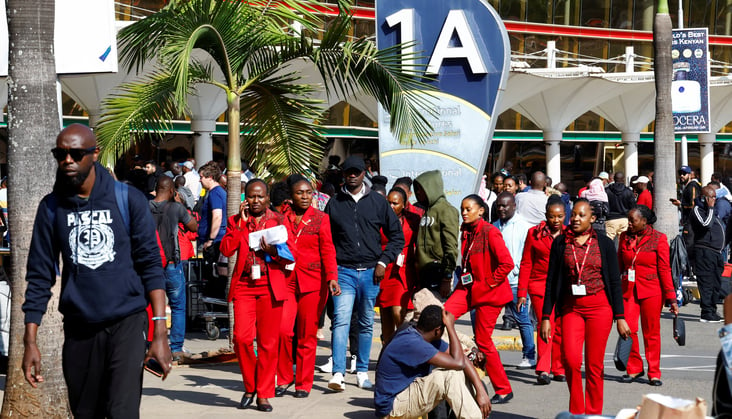Physical Address
60 Ekwema Cres, Layout 460281, Imo
Physical Address
60 Ekwema Cres, Layout 460281, Imo

Several flights were canceled, leaving hundreds of travelers stranded at Jomo Kenyatta International Airport (JKIA) as aviation workers initiated a strike against a controversial proposal to lease the airport to India’s Adani Group for a period of 30 years.
The strike, which began early Wednesday morning, has resulted in significant disruptions at East Africa’s busiest transport hub, affecting both international and domestic flights.
At 10:00 AM on Wednesday, a check revealed that no flights had landed or taken off from Jomo Kenyatta Airport.
Data from Flightradar indicated minimal activity, underscoring the severity of the situation.
Kenya Airways issued a statement alerting passengers that the strike by some JKIA staff had led to delays and potential cancellations of flights, both departing and arriving.
The Kenya Airports Authority (KAA) has yet to respond to inquiries regarding the strike, which has drawn widespread attention and concern from travelers and stakeholders alike.
The strike is led by the Kenya Aviation Workers Union (KAWU), whose representatives have expressed deep concerns over the Adani lease proposal.
They fear that the deal could lead to mass layoffs, significantly impacting the livelihoods of airport workers.
Moss Ndiema, KAWU’s secretary general, stated, “The government has failed to provide the documents we requested for the Adani deal. The strike will go on until the government stops the deal.”
The union’s demands highlight a growing discontent among workers regarding transparency and the implications of the lease.
They have called for an immediate halt to any clandestine activities by Adani representatives around JKIA, demanding clarity on the future of the airport and its workforce.
The Kenyan government has defended the proposed lease to the Adani Group, arguing that it is a necessary step to expand JKIA amid budget cuts for development projects.
However, officials have also emphasized that no final decision has been made regarding the lease.
A Kenyan high court has temporarily suspended the 30-year build-operate-transfer concession, pending further legal review.
This suspension comes amidst rising opposition to the deal, which has been criticized for including clauses that would prevent Kenya from constructing or expanding competing airports for the duration of the lease.
Read Next: Kenya Approves a $907 Million Proposal from Adani Energy Solutions
In a last-ditch effort to quell the unrest, the government attempted to engage with KAWU representatives earlier this week.
However, these attempts were met with accusations of negligence from state officials and airport management regarding the workers’ concerns.
On September 3, a delegation of 16 Kenyan officials traveled to India to conduct due diligence on Adani Group, including a review of the company’s financial records.
Concurrently, representatives from Adani were in Nairobi, suggesting that negotiations were progressing.
This dual movement has raised suspicions among workers about the transparency of the deal-making process.
As the strike continues, the future of Jomo Kenyatta International Airport hangs in the balance.
The ongoing labor action not only highlights the workers’ fears regarding job security but also raises critical questions about the governance and management of Kenya’s aviation sector.
The outcome of the negotiations between the government and KAWU will be pivotal in determining the fate of the Adani lease proposal and the operational stability of JKIA.
With both domestic and international travelers affected, the situation remains fluid, and the need for a resolution is becoming increasingly urgent.
As the strike persists, stakeholders are closely monitoring developments, hoping for a resolution that addresses the concerns of workers while also considering the strategic needs of Kenya’s aviation infrastructure.
Was this information useful? Drop a nice comment below. You can also check out other useful contents by following us on X/Twitter @siliconafritech, Instagram @Siliconafricatech, or Facebook @SiliconAfrica.